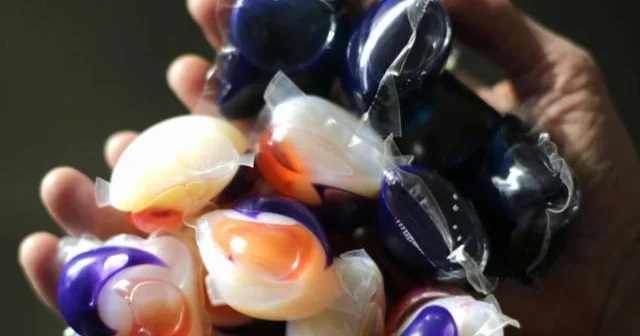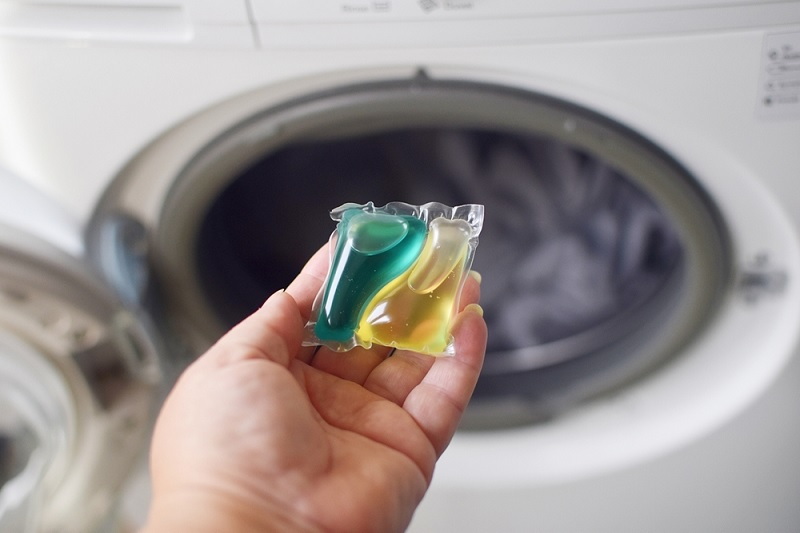Dongguan UFine Daily Chemical Co.,Ltd.
- All
- Product Name
- Product Keyword
- Product Model
- Product Summary
- Product Description
- Multi Field Search
Views: 222 Author: Tomorrow Publish Time: 11-13-2025 Origin: Site











Content Menu
● Understanding laundry pods and their design
● Storage principles for laundry pods
● Dispenser containers can offer several benefits:
● Potential risks and drawbacks of placing pods in a dispenser
● Best practices for using dispensers with laundry pods
● Alternatives to using a dispenser
● Environmental and safety considerations
● Maintenance and cleaning tips for dispenser use
● Practical scenarios and decision guidelines
● Safety-first approach and consumer education
● Comparative analysis: pods vs. traditional detergents in dispensers
● Practical maintenance checklist
● Environmental stewardship and end-of-life considerations
● Bottom-line guidance for households
● FAQ
>> 1. Is it safe to put laundry pods in any dispenser?
>> 2. Will pods dissolve inside a dispensers with a tight seal?
>> 3. Can placing pods in a dispenser save space?
>> 4. How should I store pods to keep them safe from children?
>> 5. What signs indicate a pod has been compromised inside a dispenser?
Laundry pods have become a convenient and popular choice for households seeking easy-to-use laundry products. They combine detergent, stain remover, and other cleaning agents in a single, pre-measured packet. However, as consumer habits evolve, many people wonder whether it is safe or appropriate to place laundry pods inside a dispenser, such as a detergent bottle, storage bin, or built-in laundry system. This article explores the considerations, potential risks, best practices, and practical guidance to help you decide how to handle laundry pods in your home.

Laundry pods are made from a dissolvable film that contains detergent and sometimes additives like brighteners, enzymes, or scents. When placed in water, the film dissolves, releasing the cleaning agents. The design aims to deliver consistent dosing, reduce spills, and improve user experience. However, the film and the pod as a whole are not indestructible; exposure to moisture, heat, or physical pressure can compromise the pod's integrity and cause premature dissolution or leakage.
To maintain safety and effectiveness, consider these storage principles:
- Keep pods sealed in their original packaging or in a tightly closed, moisture-resistant container.
- Store in a cool, dry place away from direct sunlight and heat sources.
- Keep out of reach of children and pets to prevent accidental ingestion or exposure.
- Avoid transferring pods to tubs, jars, or dispensers that are not airtight, especially if the container is susceptible to humidity.
- Do not pour pods loosely into a dispenser that is not designed for single-dose products.
Why people consider dispensers
- Reduced risk of direct contact with detergent powder or liquid.
- A neater, organized laundry area with fewer loose pods.
- Easy visibility of remaining stock when the dispenser has a window or clear design.
- Some people prefer the tactile or ritual of dispensing detergent.
- Premature dissolution: If the dispenser is not moisture-controlled, pods can begin dissolving inside the container, especially in humid climates or kitchens with poor ventilation.
- Leakage and contamination: Damaged pods can leak contents into the dispenser, leading to messy cleanup and potential exposure.
- Inadequate dosing: Some dispensers do not provide a precise, single-dose portion, risking over- or under-dosing.
- Reduced safety: If a dispenser is accessible to children or pets, exposed residues can be hazardous if ingested or contacted.
- Labeling and allergy concerns: Detergent ingredients may become less clearly associated with a particular product once transferred, complicating allergy awareness or product choice.
If you choose to use a dispenser for laundry pods, follow these guidelines to minimize risk:
- Use an airtight, moisture-controlled dispenser designed for pods or single-dose products.
- Place the dispenser in a dry cabinet or shelf away from heat sources and moisture-prone areas like laundry sinks or dishwashers.
- Ensure the dispenser has a secure lid or closing mechanism to prevent accidental exposure.
- Store only intact pods in the dispenser and replace any damaged or softened pods immediately.
- Label the dispenser clearly with the product name and usage instructions to maintain proper dosing awareness.
- Keep the dispenser out of reach of children and pets; use childproof features if available.
- Periodically inspect the container for signs of moisture ingress, swelling, or corrosion of the packaging.
- Keep pods in their original packaging or a sealed, rigid container designed for pods, with a tight-fitting lid to protect against moisture.
- Use a dosing cup or a dedicated, clearly labeled single-dose dispenser that maintains pod integrity.
- For households with high humidity, consider switching to traditional liquid or powder detergents stored in moisture-proof containers with integrated measuring systems.
- Packaging: Pods often rely on plastic films and outer cartons. Recycling programs may differ by location, so check local guidelines for recycling or disposal.
- Child safety: A responsible storage strategy reduces the risk of accidental ingestion or exposure. Always place products in high cabinets or locked spaces if children are present.
- Aquatic toxicity: Any detergent can impact waterways if disposed of improperly. Use the recommended amount and avoid pouring unused residue down the drain.

- Regularly clean the dispenser to prevent residue buildup that could attract moisture or harbor mold.
- Dry the interior with a clean cloth if you notice any dampness after opening the container.
- Replace the dispenser if signs of wear or corrosion appear, especially around seals and closures.
- Low-humidity homes with dedicated, purpose-built pod dispensers: In this scenario, a high-quality, airtight dispenser may be suitable. Regular checks for moisture ingress and clear labeling are essential.
- High-humidity environments (basements, laundry rooms with poor ventilation): It is generally safer to avoid dispensers for pods. Keep pods in sealed original packaging and use a moisture-proof cabinet.
- Multi-family housing or households with children: Prioritize safety over convenience. Use locked storage and childproof containers, and avoid transferring pods to open or easily accessible dispensers.
- Occasional use and travel: If you travel with pods or need a portable dispensing option, choose a compact, rigid, airtight container designed for single-use products and ensure it remains dry.
Manufacturers and retailers bear responsibility for clear labeling and usage instructions. Consumers should read the product label to understand whether a particular dispenser is recommended by the brand. Clear consumer education about the risks of moisture exposure, dosing accuracy, and safety can reduce accidental exposures and product waste.
A structured comparison helps clarify decisions. The table below contrasts key attributes:
Pod-based detergents in dispensers | Traditional liquid detergents or powders in dispensers
- Designed for single-dose delivery; risk of premature dissolution if moisture infiltrates remains a concern.
- Requires airtight, moisture-controlled containers; dosing precision depends on dispenser design.
- Potentially neater appearance; convenient for pre-measured usage.
- Higher safety concern for children if dispensers are not lockable or labeled.
- May simplify inventory management if a dispenser window shows remaining stock.
- Typically more robust in non-airtight dispensers but depends on product viscosity and formulation.
- Liquid detergents: dosing relies on cap measurements; software-like cup systems can improve accuracy in some setups.
- Powders: risk of clumping in humid environments; dispensers must prevent moisture exposure.
- Generally less sensitive to occasional spills, but exposure to air can affect fragrance and pigments over time.
- Child safety varies with container design and labeling.
- Inspect containers quarterly for cracks, seals, and closures.
- Test tightness by gently closing the lid and simulating routine usage.
- Replace any pods that exhibit signs of damage or softening.
- Clean the dispenser interior every few months to prevent residue buildup.
- Keep a small emergency kit with extra pods and a spare airtight container for quick replacement.
- Recyclability of pods depends on packaging materials. Favor brands with recyclable outer cartons and recyclable film if available in your region.
- Consider refill options that minimize plastic waste, such as concentrated formulas shipped in smaller packaging or recyclable pouches.
- Proper disposal of damaged pods should follow local guidelines to minimize environmental impact.
- If moisture protection, dosing accuracy, and safety are your top priorities, keep pods in their original packaging and use a dedicated, manufacturer-approved dispenser if advised.
- If you value convenience and neatness and you can maintain a strictly dry environment with a high-quality dispenser, a pod-dedicated setup can work.
- Always supervise children around cleaning products, and store in locked or high locations to mitigate risk.
Using laundry pods in a dispenser can be convenient, but it requires careful attention to moisture control, container design, and safety considerations. If you decide to proceed, choose an airtight, moisture-resistant dispenser specifically suitable for pod storage, keep the setup out of reach of children and pets, and monitor for signs of deterioration. If moisture or signs of degradation appear, revert to original packaging or a more secure storage solution to maintain safety and dosing accuracy.

It is safe only if the dispenser is designed to be moisture-resistant, airtight, and compatible with pod packaging. Using an inappropriate dispenser can increase the risk of premature dissolution or leakage.
If the dispenser is truly dry and airtight, pods should remain intact. In practice, humidity, temperature changes, or minor leaks can cause partial dissolution over time.
Yes, a properly sealed, moisture-controlled dispenser can reduce clutter and improve organization. However, the added risk of premature dissolution should be weighed.
Store pods in a locked cabinet or high, inaccessible shelf, preferably inside their original packaging or a dedicated, childproof container.
Look for softened or bloated pods, liquid leakage, a strong detergent odor outside the container, or any dampness inside the dispenser. If you detect any of these, stop using the dispenser and replace the product.